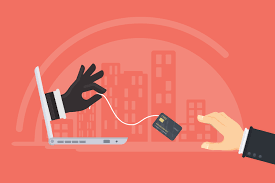Categories
Scams, OnLine Scams, Digital SecurityPublished October 24, 2025
The Digital Deception Playbook: How to Outsmart Online Scams in 2025

Every click, like, and login leaves a digital trail — and cybercriminals are getting better at following it. As online scams grow more sophisticated, protecting your personal and financial data has never been more important.
In 2024 alone, cyber-enabled fraud accounted for nearly 83% of all financial losses reported to the FBI. The bigger your online footprint, the easier it is for scammers to find and exploit you. But with the right precautions, you can drastically reduce your risk without disappearing from the digital world.
🕵️♂️ Protect Your Digital Footprint
Think before you share. Every post, “check-in,” and profile detail helps scammers learn more about you.
Simple steps to protect yourself:
-
❓ Ask “Why?” before sharing personal information online.
-
📍 Turn off location services on your mobile devices.
-
🤫 Don’t overshare personal details on social media.
-
🚫 Avoid clicking on sponsored ads — bookmark trusted sites instead.
-
⚠️ Never click unsolicited links in texts, pop-ups, or emails.
💸 The Rise of Investment Scams
Online investment scams are skyrocketing — and investors are now among the top targets for internet crime. These schemes often start with a friendly message or connection request and end with lost savings.
Red flags to watch for:
-
“Guaranteed” or “risk-free” returns — they don’t exist.
-
Promises of “inside tips” or “can’t-miss opportunities.”
-
Imposters posing as financial professionals or friends.
How to protect yourself:
-
Be wary of “pump and dump” schemes that artificially inflate stock prices.
-
Verify all investment opportunities independently — never take advice from social media.
-
Double-check the sender of any investment-related communication.
-
Set up account and security alerts to stay informed in real time.
📧 Email Compromise Scams
You don’t need to work in finance to become a target. Cybercriminals can hijack personal or business email accounts to request wire transfers or update payment details — all while appearing completely legitimate.
Stay secure by:
-
Using strong, regularly updated passwords.
-
Verifying all fund requests through a known contact number (not one in the email).
-
Updating operating systems and antivirus software.
-
Enabling 2-Factor Authentication on all sensitive accounts.
-
Signing up for account activity alerts through trusted apps like MyMerrill or Bank of America.
✉️ Check Fraud Is Back
Mail theft is making a comeback. Criminals steal mailed checks, alter details, and cash them before you even realize they’re gone.
Prevent check fraud by:
-
Using Bill Pay, ACH, or secure wire transfers instead of mailing checks.
-
Depositing checks via mobile app and writing “For Deposit Only” before submission.
-
Mailing checks only through certified mail or inside the Post Office.
-
Reviewing bank statements frequently for unusual activity.
📱 Bank Imposter Scams
Beware of fraudsters posing as your bank via spoofed caller IDs. They’ll warn you of “suspicious activity” and ask you to move funds to a “safe” digital wallet — which is really theirs.
Protect yourself by:
-
Never transferring money to resolve “fraud.”
-
Hanging up and calling your bank directly using the number on your card.
-
Removing any suspicious accounts from your digital wallet immediately.
-
Remember: No legitimate bank will ever ask you to move funds to another account to fix fraud.
👻 The “Phantom Hacker” Scam
This new, multi-step scam combines tech support, bank imposters, and fake government officials to create a convincing illusion of legitimacy.
How it unfolds:
-
Tech support call: Claims there’s fraud and asks you to download software or give remote access.
-
Bank imposter: Follows up, urging you to transfer funds to a “safe account.”
-
Government official: Calls to “confirm” the transfer, sometimes sending fake documentation.
Your defense:
-
Never download software at someone’s request.
-
Never allow remote access to your computer.
-
Ignore pop-ups or warnings urging “immediate action.”
-
Hang up and call the official number on your bank card.
💰 Wire Transfer Scams
Wire scams are still one of the costliest forms of fraud — especially during real estate transactions.
Watch out if:
-
You’re pressured to act fast.
-
Wire instructions change at the last minute.
-
You’re asked to send money to someone you’ve only emailed.
Always:
-
Verify wire details directly with your recipient using a trusted phone number.
-
Consult your financial advisor before wiring large sums.
-
Pause and double-check — once a wire is sent, recovery is often impossible.
🧭 Final Takeaway
Cybercriminals rely on trust, urgency, and distraction. By slowing down, verifying requests, and taking small proactive steps, you make yourself a much harder target.
Stay alert. Stay skeptical. Stay safe.
Your privacy — and your money — depend on it.
www.chatelgroup.com





